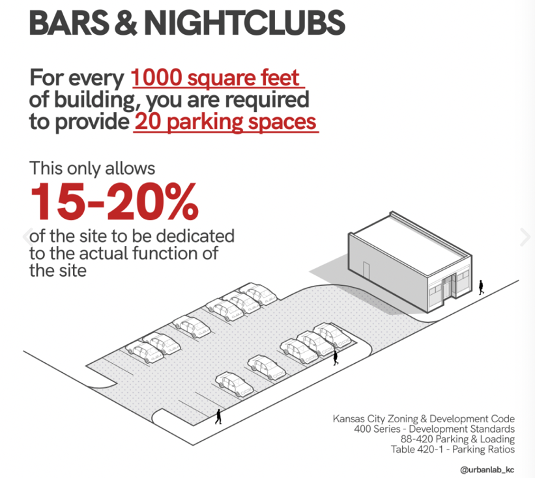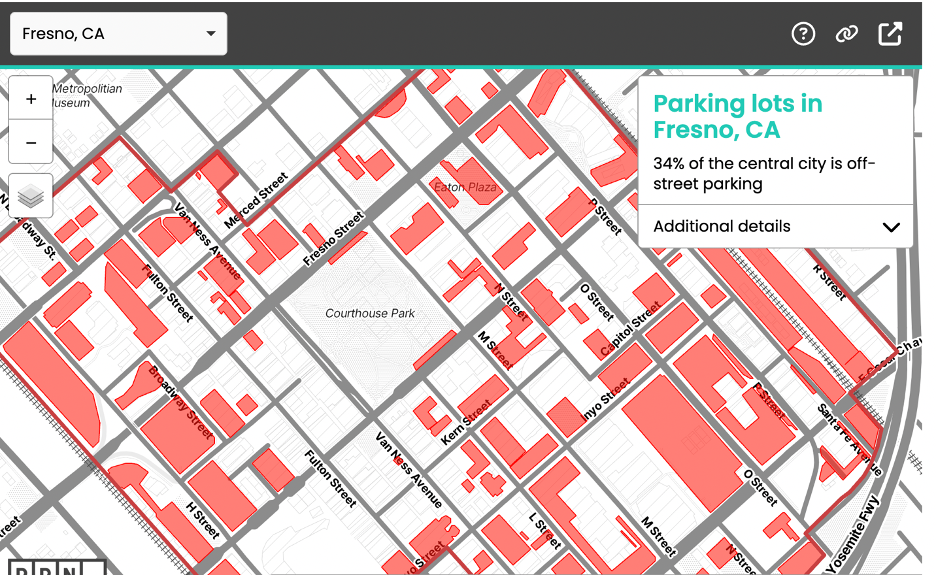Do Dead People Need Parking Spots?
And Other Absurdities About Parking Minimums
Picture this: you and seven of your friends die, you all get buried in a cemetery in Carver, Massachusetts….and the local government requires the eight of you -who are all dead- to have a parking spot. That’s right- in addition to parking spots for every two workers, Carver requires an additional spot for every 8, um, permanent residents. Welcome to the absurd world of parking minimums.
In Los Angeles, churches must have a parking spot for every 5 pew seats. In Charlotte, daycares must have a parking spot for every ten kids (plus one for every worker). Kansas City requires bars to have so many parking spots that only a fifth of the land is usable, which arguably encourages drunk-driving.

Gilbert, Arizona requires haunted houses to have one parking spot for every 100 feet of floor space. Since a parking space —together with the necessary driving lanes—takes up about 300 square feet, that means the parking area ends up being roughly three times larger than the haunted house itself. That’s a scary ratio for all kinds of reasons!
There are parking minimums for public swimming pools, mini-golf, sewage treatment facilities, you name it. And on top of making our cities less walkable, generally being an eyesore, and being bad for the environment, requiring all these parking spaces drives up costs. They may feel free, but they’re actually really expensive.
It’s time for the government to stop mandating parking minimums.
Parking Minimums Over-Regulate Business, Raise Costs, and Block Housing
There are a lot of parking minimums, and they force society to devote a staggering amount of space to car storage. The United States has roughly 2 BILLION parking spots. Many suburban municipalities set parking minimums so high that they effectively require retail developers to devote more space to parking than to the buildings themselves. In cities like Fresno, a third or more of the total land area is used for off-street parking.

The justifications for this excess are flimsy at best. As the late Donald Shoup, widely regarded as the leading expert on parking mandates, said the planning for parking is “pseudoscience.” Shoup spent decades studying parking and basically came to the conclusion that it’s astrology with asphalt.
He’s right. Parking minimums often assume the highest possible level of use and mandate capacity for that, but doing that -as they say- is building the church for Easter, or in this case, the big-box store parking lot for Black Friday. For the vast majority of shopping locations, that level of parking is almost never needed, particularly now that so much shopping gets done online. As Tony Jordan, President of the Parking Reform Network notes, “People just assume these numbers are right because they’re in the zoning code…. No, they’re just made up.”
These rules also ignore the reality that businesses know their customers far better than zoning boards do. A Dunkin Donuts that knows that most of its customers will want their coffee to-go may feel that it needs very few parking spots. A specialty coffee shop built around lingering customers and high-margin drinks might want more spots. Why shouldn’t these businesses be free to make that call rather than being micromanaged by arbitrary, one-size-fits-all mandates?
Parking minimums also create a lot of additional costs for businesses. Even basic surface parking costs more than people may realize; even a basic spot costs an average of $28,000, and that’s not including the cost of the land. Often, zoning rules force developers to build parking below ground which can be even more expensive.
For businesses, that’s money siphoned away from investment and from hiring workers and/or it means higher prices for customers. For cities, it means vast amounts of land consumed by car storage instead of housing, offices, amenities, or green space. In one study, developers who received waivers from parking minimums built far fewer parking spots than those forced to comply —clear evidence that the “need” is exaggerated..
The costs are particularly punishing for affordable housing. Developers of below-market units are often forced to spend subsidy dollars on parking rather than homes, or to abandon projects entirely when small lots can’t accommodate both buildings and mandated parking. When the Census Bureau asked the owners and managers of multifamily rental housing what government regulations caused them the most difficulty, parking minimums were the most frequently cited item other than property taxes.
Shoup’s “The High Cost of Free Parking”, the single most influential book about parking as land use shows, quite persuasively, that parking minimums push buildings further apart, making cities less walkable, less pleasant, and less economically dynamic while raising housing costs, curtailing homeownership, damaging urban economies, and disproportionately harming low-income families.
The Good News: Momentum is Building to Reform and Repeal Parking Minimums
There are good arguments against parking minimums from across the ideological spectrum. A fan of free markets and private property rights can, with good reason, ask why the government needs to mandate this. Can’t businesses and other institutions figure out for themselves how much parking they need? Someone concerned with local government finances can underscore that surface parking generates very little property tax revenue compared to other land uses. A YIMBY can point to all the housing construction that parking minimums stand in the way of. An urbanist can highlight how much damage they do in terms of making cities less walkable and less pleasant. An environmentalist can point out how much that lack of walkability forces people to drive more.
It’s no surprise, then, that abolishing parking minimums has clear majority support. In fact, 62% of poll respondents say that business and property owners rather than the local government should be able to decide how much parking to provide. And another added benefit is that repealing parking minimums cost taxpayers nothing whatsoever.
Fortunately, some places are making progress. Buffalo became the first major city to repeal its parking minimum in 2017. Since then, it’s seen the development of more than 1000 new housing units, 2/3 of which would have been illegal with the parking minimums still in place. Developers at 36 new projects put in about half of the parking previously required, enabling.mixed-use development and adaptive reuse projects that had once been financially infeasible. These reforms were particularly helpful to small-scale developers who typically lack the resources to navigate variance processes.Buffalo showed that when you stop forcing people to build unnecessary parking lots….they stop building unnecessary parking lots. A revolutionary idea.
Seattle and Minneapolis saw similar results. After Minneapolis abolished its parking minimums for apartments near transit in 2018, it had a boom in new apartments being built with less parking than would have been required under the old rules. A number of cities have recently followed in these cities’ footsteps: Lexington KY, Gainesville FL, Burlington VT, Bend OR, Austin TX, Duluth MN, Longmont CO, Birmingham AL, and more. Your city can too!
Cities, or ideally states, should repeal parking minimums. Lots of policymaking is complicated and involves difficult tradeoffs. This is the rare opportunity for an easy win that’s good for affordability, comes at no cost to taxpayers, encourages growth, fights climate change, and helps businesses. In a world full of complicated problems, parking minimums are refreshingly simple: they're expensive, pointless, anti-freedom, and annoying. Let's get rid of them.
-GW



I no longer live in a city but even in our high density suburb it's shocking how much empty parking there is. There's a complex with a Target, TJ Maxx, Weis grocery and a bunch of other stores. It gets so crazy on the weekends that I try to only go on weeknights. But even on those crazy weekends with hundreds of cars parked, the parking lot never seems to get more than maybe 60% full. I'm not sure they could do anything with that space at this point, but I'm sure someone could figure something out!
In a world without parking minimums, street parking becomes the backup option. And people hate fighting for street parking. The answer is parking abundance - the city should build structured parking so that more space is left for the urban fabric people actually care about and enjoy.
Structured parking also incentives walking and biking. If people have a choice between a 15 minute bike ride and a 5 minute drive door to door, they'll often choose the drive. But if it's a 5 minute drive, a $2 parking fee, and a 5 minute walk from the parking lot to your destination, the bike option looks a lot better.
Every suburb on the San Francisco peninsula is built this way and people seem to love it.